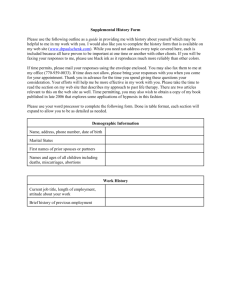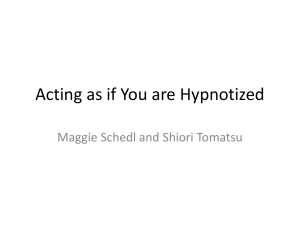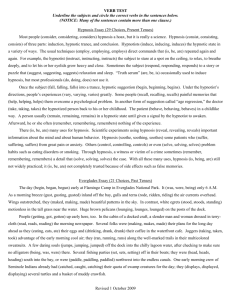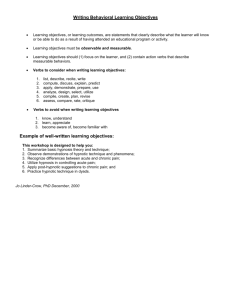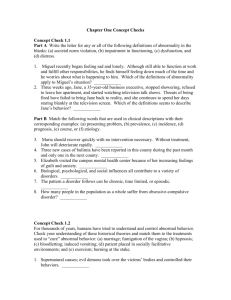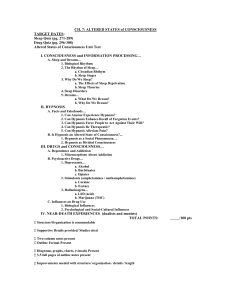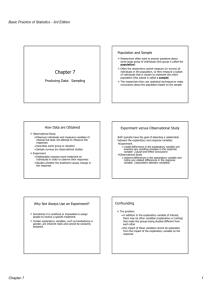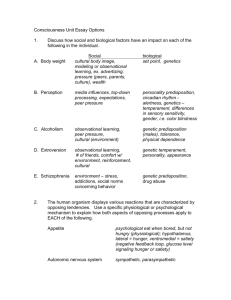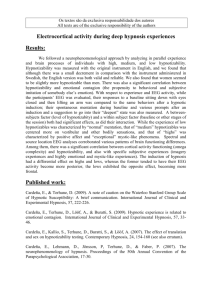The Science of Hypnosis The Decade Ahead!
advertisement
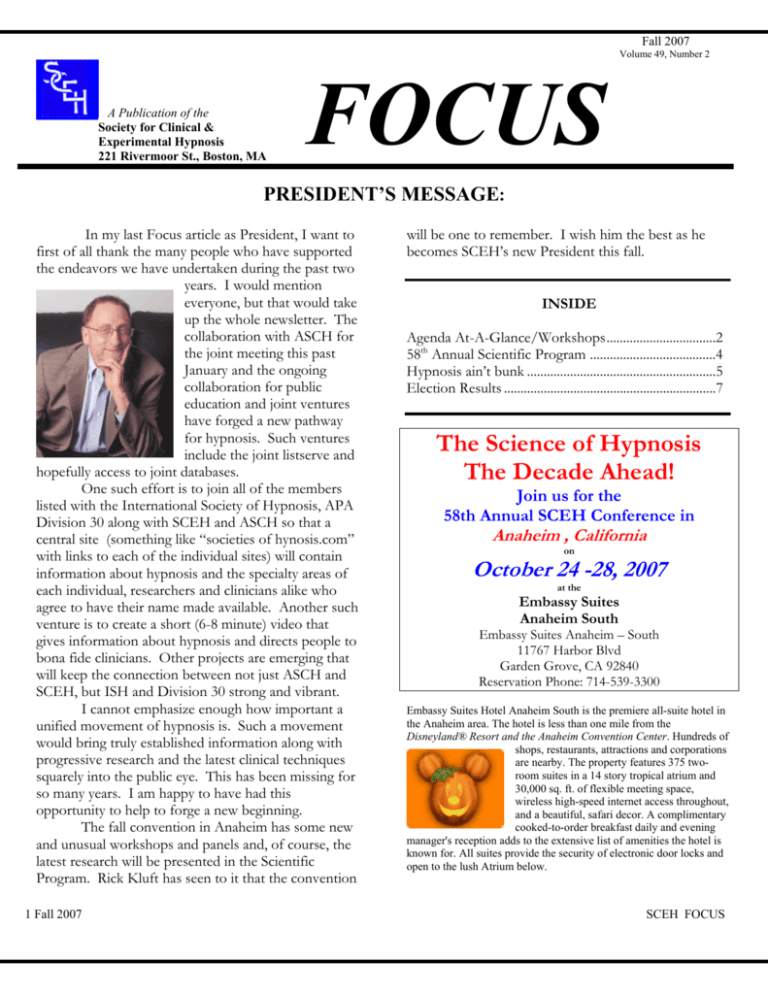
Fall 2007 Volume 49, Number 2 A Publication of the Society for Clinical & Experimental Hypnosis 221 Rivermoor St., Boston, MA FOCUS PRESIDENT’S MESSAGE: In my last Focus article as President, I want to first of all thank the many people who have supported the endeavors we have undertaken during the past two years. I would mention everyone, but that would take up the whole newsletter. The collaboration with ASCH for the joint meeting this past January and the ongoing collaboration for public education and joint ventures have forged a new pathway for hypnosis. Such ventures include the joint listserve and hopefully access to joint databases. One such effort is to join all of the members listed with the International Society of Hypnosis, APA Division 30 along with SCEH and ASCH so that a central site (something like “societies of hynosis.com” with links to each of the individual sites) will contain information about hypnosis and the specialty areas of each individual, researchers and clinicians alike who agree to have their name made available. Another such venture is to create a short (6-8 minute) video that gives information about hypnosis and directs people to bona fide clinicians. Other projects are emerging that will keep the connection between not just ASCH and SCEH, but ISH and Division 30 strong and vibrant. I cannot emphasize enough how important a unified movement of hypnosis is. Such a movement would bring truly established information along with progressive research and the latest clinical techniques squarely into the public eye. This has been missing for so many years. I am happy to have had this opportunity to help to forge a new beginning. The fall convention in Anaheim has some new and unusual workshops and panels and, of course, the latest research will be presented in the Scientific Program. Rick Kluft has seen to it that the convention 1 Fall 2007 will be one to remember. I wish him the best as he becomes SCEH’s new President this fall. INSIDE Agenda At-A-Glance/Workshops .................................2 58th Annual Scientific Program ......................................4 Hypnosis ain’t bunk .........................................................5 Election Results ................................................................7 The Science of Hypnosis The Decade Ahead! Join us for the 58th Annual SCEH Conference in Anaheim , California on October 24 -28, 2007 at the Embassy Suites Anaheim South Embassy Suites Anaheim – South 11767 Harbor Blvd Garden Grove, CA 92840 Reservation Phone: 714-539-3300 Embassy Suites Hotel Anaheim South is the premiere all-suite hotel in the Anaheim area. The hotel is less than one mile from the Disneyland® Resort and the Anaheim Convention Center. Hundreds of shops, restaurants, attractions and corporations are nearby. The property features 375 tworoom suites in a 14 story tropical atrium and 30,000 sq. ft. of flexible meeting space, wireless high-speed internet access throughout, and a beautiful, safari decor. A complimentary cooked-to-order breakfast daily and evening manager's reception adds to the extensive list of amenities the hotel is known for. All suites provide the security of electronic door locks and open to the lush Atrium below. SCEH FOCUS Agenda At-A-Glance/Workshops Co-chairs Claire Frederick, M.D. and Donald Stolar, Ph.D. Wednesday, October 24, 2007 Thursday, October 25, 2007 6:30 - 9:30 pm Introductory Workshop in Clinical Hypnosis (session 1 of 4) Chair: Marilee Snyder, MSW, DCSW, Mental Health Center of Boulder County, Boulder, CO Faculty: Claire Frederick, M.D., Saybrook Graduate School and Research Center, Hedy Howard, M.D., Chevy Chase, MD, Stephen Kahn, Ph.D., Chicago School of Professional Psychology, Brenda King, Ph.D., Lipp, Carlson, Lommen, & Witucki, Ltd., Grand Forks, ND, Dave Patterson, Ph.D., University of Washington, Donald Stolar, Ph.D., UCLA School of Medicine and Dave Wark, Ph.D., University of Minnesota 8:30 am- 6:15 pm Intermediate Workshop in Clinical Hypnosis (session 1 of 4) Co-Chairs: Mark Geer, Ed.D., Bournewood Hospital, MA and Nancy Reimer, LICSW Faculty: Arreed Barabasz, Ph.D., Washington State University, Claire Frederick, M.D., Saybrook Graduate School and Research Center, Stephen Kahn, Ph.D., Chicago School of Professional Psychology, Samuel Migdole, Ph.D., Beverly, MA, Marilee Snyder, MSW, DCSW, Mental Health Center of Boulder County, Dave Patterson, Ph.D., University of Washington Affect Regulation and Resiliency Training for Couples Co-Chairs: Carolyn Daitch, Ph.D., Center for the Treatment of Anxiety Disorders and Stephen Kahn, Ph.D., Chicago School of Professional Psychology A Pragmatic Approach to Risk Reduction in the Clinic and the Workshop Chair: Richard P. Kluft, M.D., Temple University School of Medicine Professional Growth: Integrating Hypnosis into Your Practice Co-Chairs: Molly DeLaney, Psy.D., Damariscotta, ME, Stephen Kahn, Ph.D., Chicago School of Professional Psychology, David Smith, Ph.D., St. Bernard’s Hospital, Chicago, IL Hypnosis for Skin Procedures and Disorders Chair: Philip D. Shenefelt, M.D., University of South Florida College of Medicine 2 Fall 2007 Introductory Workshop in Clinical Hypnosis (session 2 of 4) (faculty-see Wed. schedule) Intermediate Workshop in Clinical Hypnosis (session 2 of 4) (faculty-see Wed. schedule) 9 am - 4 pm Strengthening, Repair, and Uncovering with Complex PTSD Patients Chair: Claire Frederick, M.D., Saybrook Graduate School and Research Center Using Ideomotor Signals for Rapid Hypnoanalysis Chair: Dabney Ewin, M.D., Tulane University Hypnosis in Cancer Care: Altering Perception and Reality Chair: David Spiegel, M.D., Stanford University School of Medicine 9 am - 12 pm Self Hypnosis Workout: Keeping the Body-Mind in Peak Condition Chair: Darlene A. Osowiec, Ph.D., Geneva, IL 1 - 4 pm Hypnotherapeutic Techniques Refresher Co-Chairs: Arreed Barabasz, Ph.D., Washington State University & IJCEH and Ciara Christensen, Ph.D. student, Washington State University SCEH FOCUS Friday, October 26, 2007 Saturday, October 27, 2007 8:30 am- 4:45 pm 8:45 am- 12:15 pm Introductory Workshop in Clinical Hypnosis (session 3 of 4) (faculty-see Wed. schedule) Introductory Workshop in Clinical Hypnosis (session 4 of 4) (faculty-see Wed. schedule) Intermediate Workshop in Clinical Hypnosis (session 3 of 4) (faculty-see Wed. schedule) Intermediate Workshop in Clinical Hypnosis (session 4 of 4) (faculty-see Wed. schedule) 9 am - 4 pm 9 am - 12 pm Clinical Case Conference for Current Psychotherapy Patients Chair: Donald Stolar, Ph.D., UCLA School of Medicine Working with Moderately Hypnotizable Patients and Maximizing Their Clinical Responses Chair: Robert A. Karlin, Ph.D., Rutgers University Treating Dissociation and Dissociative Disorders Chair: Richard P. Kluft, M.D., Temple University School of Medicine The Next Hypnosis: Consciousness, Spirituality and Mind-Body Medicine Chair: Reginald B. Humphreys, Ph.D., Dallas, TX Hypnosis for Acute and Chronic Pain Co-Chairs: Mark Jensen, Ph.D., University of Washington and David Patterson., Ph.D., University of Washington 9 am - 12 pm Mind-Body Hypnotic Interventions in the Treatment of Auto-Immune Disorders Chair: Moshe S. Torem, M.D., Ohio University College of Medicine Advanced Intensive on Developing and Enhancing Imagery Tools and Techniques to More Effectively Modify Neuropatterns Co-Chairs: James H. Straub, Ed.D., University of Missouri-Columbia and Vicki W. Straub, Ph.D., M.B.A., University of Missouri-Columbia School of Medicine Habit Control Chair: Samuel Migdole, Ed.D., Beverly, MA 7 - 8 pm No-Host Cocktail Reception 8 pm Presidential Banquet and Awards Ceremony (Pre-registration required) Early Career Initiative Activities 1 - 4 pm Breakfast Thursday, October 24 from 7:30–8:30 am For Graduate Students and New Professionals Clinical Hypnosis as a Therapeutic Tool in Pediatric Perioperative Care and Pain Management Chair: Haleh Saadat, M.D., Yale University School of Medicine Lunch Thursday, October 24 from 12 pm–1 pm Conversation Hour: Getting Published as a New Professional Lunch with Arreed Barabasz, Ph.D., IJCEH Editor Breakfast Friday, October 25 from 7:30–8:30 am Beginning a Practice in Hypnotherapy Breakfast with Steve Kahn, Ph.D., SCEH President 3 Fall 2007 SCEH FOCUS Are Hypnotic Inductions and Suggestibility Scales Comparable? Sean M. Barnes, Ph.D. student Hypnosis and Mirror Writing Thomas Ball, Ph.D. 58th Annual Scientific Program October 26-28, 2007 Co-chairs Mark Jensen, Ph.D. and David Patterson, Ph.D. Friday, October 26, 4:30–6:00 pm Panel Discussion on the Definition of Hypnosis Panel: Arreed Barabasz, Ph.D., Elgan Baker, Ph.D., Guy Montgomery, Ph.D., Karen Olness, M.D., David Spiegel, M.D., Michael Nash, Ph.D. Chair: Stephen Kahn, Ph.D. 6:00–7:00 pm Keynote Address: Meditation and Psychotherapy Paul Fulton, Ed.D. Introduction by Stephen Kahn, Ph.D. Saturday, October 27, 9–10:50 am Innovative Laboratory Research Hypnotic Analgesia and Hyperalgesia Suggestions: Effects on Somatosensory EventRelated Potential Prof. Vilfredo De Pascalis Hypnotic Suggestibility Modification: Encouraging Findings Elza Boycheva, Ph.D. student 4 Fall 2007 Effects of a Transitional Object Affect Bridge for Age Regression: Spontaneity Ciara Christensen, Ph.D. student, Arreed Barabasz, Ph.D. and Marianne Barabasz, Ed.D. Chair and Discussant: Arreed Barabasz, Ph.D. 11–11:30 am Clinical Implications of Research Studies Panel Discussion Elgan Baker, Ph.D. and Stephen Kahn, Ph.D. 11:30 am–12:30 pm Hypnotherapy for Irritable Bowel Syndrome and Related Conditions Vivien Miller, M.Sc., D.Hyp. 1:30–2 pm Hypnosis in High-Tech Somatic Medicine: Its Value, Wide Applicability and Easy Integration into Everyday Practice Christel Bejenke, M.D. Introduction by Mark Jensen, Ph.D. 2–4 pm New Clinical Research Live vs. Taped Hypnosis for Dermatologic Procedures Philip D. Shenefelt, M.D. Hypnosis for Surgical Procedures Haleh Saadat, M.D. The Trouble with Incomplete Empathy: Unexpectedly High Adverse Event Rate in a Prospective Randomized Trial Assessing Hypnosis during Tumor Treatments Elvira V. Lang, M.D. SCEH FOCUS Virtual Reality Hypnosis Dave Patterson, Ph.D. Effects of Hypnosis and Cognitive-Behavioral Therapy on Positive and Negative Affect during Breast Cancer Radiotherapy Julie Schnur, Ph.D. student Fatigue during Breast Cancer Radiotherapy: Effects of a Hypnosis plus CBT Intervention Guy Montgomery, Ph.D. Chair and Discussant: Steven Lynn, Ph.D. 4:10–6 pm The Psychoanalyst Looks at the Hypnotist A. A. Mason, M.B.B.S., Psy.D., F. Inst. Psychoanal. Panel: Elgan Baker, Ph.D. David Spiegel, M.D., Michael Nash, Ph.D. Moderator: Richard P. Kluft, M.D. Sunday, October 28, 9–10 am Genetics of Complex Traits: Hypnotizability, Behavior and Mental Health Maximilian Muenke, M.D. Introduction by Richard P. Kluft, M.D. 10–10:20 am The Dopamine Hypothesis of Hypnotizability: Current Status Pesach Lichtenberg, M.D. 10:30 am–12 pm Case Studies in Hypnosis: Innovative Approaches The Clinical Challenges of Working with Patients Who Present with Refractory OCD Claire Frederick, M.D. Smoking Cessation Joseph Green, Ph.D. Hypnosis and Tennis Performance Kenneth Guttman, Ph.D. 5 Fall 2007 Hypnotically Reconstructed Memories of Traumatic Events Leading to Arrests and Convictions Arreed Barabasz, Ph.D. Treating Amputees with Hypnosis Marianne Barabasz, Ed.D. 12–12:30 pm Research Implications of Case Studies Panel Discussion Arreed Barabasz, Ph.D., Elvira Lang, M.D., Dave Patterson, Ph.D. Hey! Hypnosis ain’t bunk. David Paul Smith, M.A., Ph.D. St. Bernard’s Hospital, Chicago drdpsmith@stbh.org The SCEH conference, "The Science of Hypnosis – The Decade Ahead" suggests exciting prospects for the near future. Underlying this promise is the concern that hypnosis has not come into the scientific limelight, still! We are continuing to overcome a, “ side show reputation.” As our president suggested in his message in the last issue of Focus, “people STILL think of hypnosis as turning otherwise stable individuals into barking dogs and quacking ducks.” Or, as one colleague mentioned when I stated I was leaving town to attend a hypnosis conference, “Oh, yeah, I think that stuff is mostly bunk.” A bit better, the following exchange took place at a meeting I attended in a prominent university hospital, in Chicago. It came to light that I was certified in hypnosis and the director of training stated to the chief of psychiatry that he had been certified also. As the chief of psychiatry looked on silently and inquisitively, the director said, “Well, the stuff works.” As most people in the field know, hypnotic techniques have been around as long as healers have been attempting to alleviate ailments in their brethren. It dates back to traditional practices of shamans and witch doctors. The scientific history of hypnosis begins SCEH FOCUS at the end of the 18th century with Mesmer. (Brown and Fromm, 1986). Many subjective phenomena have not entered the main scientific arena until recent decades, e.g., meditation, lucid dreaming and other self regulatory strategies. Now, with the promotion of positive psychology and the development of new technologies, from bio-feedback to recent developments in brain imaging, many old techniques relegated to subjectivity and the “non-scientific” are no longer easily dismissed. Truly, we have come to a very exciting time in history when psychological phenomena such as hypnosis are more easily measured and demonstrated. Nevertheless, hypnosis and therapists that utilize hypnotic techniques are often not well represented in the field at large. For example, the Society of Psychotherapy research is an international organization that is comprised of several thousand members. Over the last ten years of conferences, where hundreds of papers are presented, I was able to find two presentations on hypnosis and one was the paper I had recently presented. The respondent to that paper made a favorable response but his initial impression of the talk was, “hypnotherapists are here and here to stay.” If other clinicians don’t know we’re here, clearly there is real work to do in terms of educating the public. So, what of psychotherapists that utilize hypnosis in their work? Steve Kahn and I have initiated an effort to collect data on this population. I presented a paper at the international SPR conference at Madison, WI in June of this year. The presentation was based on preliminary research on hypnotherapists that was conducted in conjunction with the Collaborative Research Network and the international project on the Development of Psychotherapists (Orlinsky & Ronnestad, 2005). A pilot study collecting 21 Common Core Questionnaires from hypnotherapists was completed in 2006. This initial sample has been added to a growing database of over 7,000 psychotherapists across the globe. Still, that’s 21 therapists that filled out Steve’s hypnosis version of the CCQ out of 7,000 or so in the data base. We need to collect more questionnaires! Nevertheless, the preliminary findings on our sample of hypnotists are interesting. Overall, many of the characteristics of our hypnotist sample are similar to previous studies done with this instrument (Orlinsky & Ronnestad, 2005). Although small, the sample is diverse in terms of age training and profession. With the average age at 6 Fall 2007 approximately 54 years, it is a decidedly mature group. Furthermore, on average, the group as a whole has a fair amount of experience in terms of treating people. With the average years in practice being close to 17, the years practicing hypnosis is on average 11. This suggests that people turn to using hypnosis as an additional technique to augment their practice. The group of practitioners tend to identify themselves as “integrative and eclectic” which is consistent with previous findings among psychotherapists in general. In this particular sample, the one theoretical orientation that is somewhat more strongly endorsed is a “cognitive” approach. Nevertheless, all major theoretical orientations appear to be represented to some extent in the sample. Further research is needed to determine whether hypnotherapists as a group tend to endorse any particular theoretical orientation to a greater extent than other therapists. Therapists in our sample tend to find opportunities to use hypnosis and find it provides positive results. Negative results appear quite minimal. What is more striking, the clinicians strongly see hypnosis as having added to their effectiveness overall. There is slight support that patients who experience a deeper state of hypnosis gain better results. Regarding professional development, the clinicians see themselves as having changed and that their change is an improvement. There is also a tendency to feel that they have overcome past limitations as therapists but still have room to grow. Furthermore, witnessing a powerful change in a hypnotized subject, early in their career, did not seem to be a strong motivator to seek training in hypnosis. Although we can certainly site examples of Sigmund Freud and Erika Fromm who had that transformative professional experience. Earlier studies on over a 1,000 members of the international data base suggest that therapists are not particularly secular, as a modern perspective might suggest. This sample shows a fascinating consistency in the importance that religious or spiritual experience has on the work of these individuals. As in previous studies with this particular database (Smith & Orlinsky, 2004), the results of this group are similar to the larger number of therapists, (i.e., their spiritual and/or religious experience appears to have at least a modest influence not only in their life but in their work as therapists). SCEH FOCUS SCEH Leadership This is just an initial attempt at collecting material on the development of hypnotherapists. The details of this study are available on request and should be published soon. However, more research and more work is necessary to begin to educate the public, as well as, the professional community regarding the importance and legitimacy of hypnotic techniques and the use of hypnosis in therapy. For those who are interested in participating in our research and contributing to the representation of hypnotists in this international study, you can contact Steve Kahn or me at drdpsmith@stbh.org. We will be sure to get a copy of the questionnaire to you. Or, perhaps we’ll see you at the conference. SCEH Election Results President-Elect Elvira Lang, MD Secretary Amir Raz, PhD Treasurer Guy Montgomery, PhD With 120 votes cast, these are the new SCEH Officers. Thanks to Eric Willmarth, PhD, Philip Shenefelt, MD and Marilee Snyder, MSW for their service as candidates and to the membership for taking this responsibility so seriously. Nicholas A. Covino, PsyD Election Committee Chair President Stephen Kahn, PhD 1525 East 53rd Street #934 Chicago, IL 60615-4575 (773) 324-1155 spkahn@ameritech.net President-Elect Richard P. Kluft, MD Temple University School of Medicine Philadelphia, PA 19140 (610) 667-3250 RPKluft@aol.com Past President Nicholas Covino, PsyD Massachusetts School of Professional Psychology 221 Rivermoor Street Boston, MA 02132 (617) 327-6777 ncovino@mspp.edu Secretary Brenda King, PhD 2808 17th Ave S. Grand Forks, ND 58201 (701)-746-8376 bjking@gra.midco.net Treasurer Grant Benham, PhD University of Texas-Pan American 1201 W. University Drive Edinburg, TX 78541 (956) 292-7342 International Journal Editor Arreed Barabasz, PhD, EdD Washington State University Pullman, WA 99164 (509) 335-8166 arreed_barabasz@wsu.edu SCEH ‘FOCUS’ Editor David Paul Smith, PhD St. Bernard's Hospital Suite 212, 324 West 64th St. Chicago, Illinois 60621 (773) 962-4016 drdpsmith@stbh.org SCEH CENTRAL OFFICE Executive Director Dean Abby, MEd 221 Rivermoor Street Boston, MA 02132 (617) 469-1981 sceh@mspp.edu 7 Fall 2007 SCEH FOCUS CONTACT INFORMATION FOR CENTRAL OFFICE The Society for Clinical and Experimental Hypnosis Executive Office (c/o Dean Abby) Massachusetts School of Professional Psychology 221 Rivermoor Street Boston, MA 02132 Tel: (617) 469-1981 Fax: (617) 469-1889 Email: sceh@mspp.edu Website: www.sceh.us A Publication of the SOCIETY FOR CLINICAL AND EXPERIMENTAL HYPNOSIS Executive Office Massachusetts School of Professional Psychology 221 Rivermoor Street Boston, MA 0213 8 Fall 2007 SCEH FOCUS
